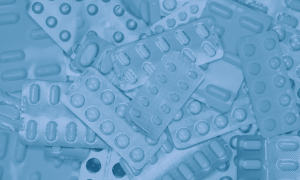'The Lancet Global Health' features the clinical trial against coronavirus that recently started in Catalonia

Dr Oriol Mitjà and Dr Bonaventura Clotet publish at The Lancet Global Health journal a study in which they present their strategy to stop the progress of the new coronavirus: do diagnostic test to all the people with symptoms of respiratory infection, even those who have light symptoms, and to treat all those that test positive.
The current coronavirus pandemic is leading to global measures such as based on isolation of cases and tracing of contacts, but even those have failed to stop the virus's spread, which now affects 168 countries and 209.839 people and caused 8.778 deaths. To take over this situation, Dr. Bonaventura Clotet and Dr. Oriol Mitjà propose at The Lancet Global Health Journal to do the diagnostic test to people with mild respiratory symptoms, treat all those who positive for coronavirus and prescribe preventive medicine to all their close contacts.
Dr. Clotet is the director of the IrsiCaixa AIDS Research Institute -promoted by “la Caixa” and the Ministry of Health of the Government of Catalonia- , president of the Fight Against AIDS Foundation (FLS) and head of the Infectious Diseases Service of the Germans Trias i Pujol Hospital in Badalona, and Dr. Oriol Mitjà, head of the department at the same service and researcher at the FLS,
The journal, thus, endorses the clinical trial that was presented last Monday and is being performed in Catalonia to reduce contagion and stop the spread of the virus. The clinical trial initially involved about 3,000 people from Conca d’Òdena, Maresme and Vallès Oriental -195 who tested positive and about 15 contacts from each patient- and the first results are expected to be out in April. The Department of Health, the Catalan Health Institute, the AIDS Foundation, the Germans Trias i Pujol University Hospital and the Rubió SA and Gebro Pharma SA pharmaceutical laboratories are supporting the inciative.
Reducing the viral load of infected people
In the article published at The Lancet Global Health, researchers emphasize that some mathematical models state that confining people and tracing viral transmission will be insufficient to stop COVID-19 as long as the factor R0 (the average number of new cases generated by each case) is higher than 1,5. It is estimated that the R0 of the coronavirus is currently higher than 2,5. Only in Spain, there are more than 13.716 affected people and has already caused 598 deaths.
Mitjà and Clotet say that antiviral administration right after the initial respiratory symptoms can reduce the transmission of the disease, by decreasing the virus load in the secretions of infected individuals. "In the case of the SARS-CoV-2 coronavirus, the viral load in sputum peaks at around 5–6 days after symptom onset and lasts up to 14 days" explains Mitjà. Home confinement measures is challenging, efficacy is variable, because it depends on the population, it is impossible to be 100% sure that everybody stays at home and moreover, people living in the same house are still be exposed" he says. The antiviral used in the trial performed in Catalonia is Darunavir, an HIV drug that is administered to people detected as positive.
Post-exposure prevention for high-risk groups
It is estimated that the incidence of coronavirus infection in those living with infected people is 15%, and 10% for close contacts. Taking this into account, Mitjà and Clotet emphasize that the current emergency calls for the development of urgent measures to prevent infection, particularly close contacts and health-care workers, among others at high risk of contagion.
The proposal is based on previous experiences of Post Exposure Prophylaxis (PrEP) drugs to prevent infections. For example, rifampicin is administered to people in contact with a meningococcal infection, and the World Health Organization recommends oseltamivir for people at high risk of infection during the flu pandemic.
Researchers point out that hydroxychloroquine, a malaria prevention drug, blocks coronavirus fusion to the host cell. The drug has been shown to be highly effective against coronaviruses - and specifically SARS-CoV-2 - in in vitro experiments, and preliminary results from a study in China of patients with coronavirus-associated pneumonia indicate that it could be effective against the current outbreak. Hydroxychloroquine is the drug that is being administered as a preventive measure for contacts in the clinical trial in Catalonia.
Available, safe and affordable drugs
Implementing this strategy requires three factors: the stockpile of drugs must be adequate, the safety of treatment must be very high, and costs should ideally be low.
Dr. Mitjà presented the strategy last Wednesday, during a meeting with the WHO Expert Committee on the development of pandemic prevention strategies. "We are also receiving inquiries from countries in Africa and Latin America that need to stop the pandemic before it is too late, as they have a weaker health system with almost no intensive care units or respiratory," he says. "We must prevent the pandemic before it causes havoc in people's and global health and economic systems. Identifying a treatment for the prevention of COVID-19 would change the rules of the game and the course of the outbreak entirely, "conclude the researchers.
#YoMeCorono Iniciative
The #YoMeCorono initiative, launched this week by the Fight AIDS Foundation, aims to raise funds for research on the new coronavirus. The fundings will be used for two projects: the clinical trial aiming to prevent infections and the research project, performed by IrsiCaixa, the Barcelona Supercomputing Center and the IRTA-CReSA, which works on developing drugs, antibodies and a vaccine against SARS-CoV-2.